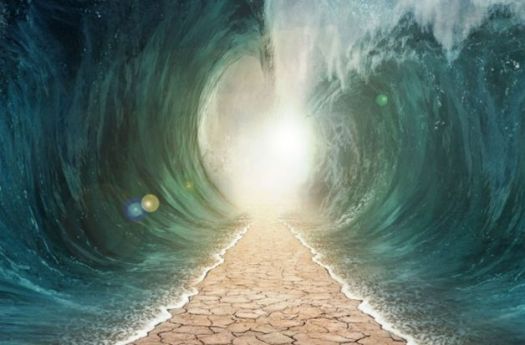Difference between revisions of "Part Water (spell)"
Tao alexis (talk | contribs) |
Tao alexis (talk | contribs) |
||
| (4 intermediate revisions by the same user not shown) | |||
| Line 1: | Line 1: | ||
| − | [[File:Part | + | [[File:Part Water (spell).jpg|right|525px|thumb]] |
| − | '''Part water''' creates a path through water, providing a dry surface on the bottom of a lake or river upon which individuals can walk, or even ride mounts. According to the area of effect, the water on either side of the path is driven back in held to distance outwards and downwards as indicated. | + | '''Part water''' creates a path through water, providing a dry surface on the bottom of a [[Lake |lake]] or [[River|river]] upon which individuals can walk, or even ride mounts. According to the area of effect, the water on either side of the path is driven back in held to distance outwards and downwards as indicated. |
{{Spelltable | {{Spelltable | ||
| Line 6: | Line 6: | ||
| range = 20 ft. per [[Experience Level|level]] | | range = 20 ft. per [[Experience Level|level]] | ||
| duration = 10 minutes per level | | duration = 10 minutes per level | ||
| − | | area of effect = 10 ft. wide path per level, 30 ft. per<br> | + | | area of effect = 10 ft. wide path per level,<br>30 ft. per level horizontally<br>and vertically |
| casting time = 3 [[Combat Round|rounds]] | | casting time = 3 [[Combat Round|rounds]] | ||
| save = none | | save = none | ||
| Line 12: | Line 12: | ||
}} | }} | ||
| − | + | To effect the spell, the initial end of the affected area must touch the shoreline or bank of the water to be crossed. Although the spell eliminates all moisture, so that travellers won't be bogged down in mud, there's no change made to the actual terrain underlying the water. Thus, the spell might expose cliffs, impassable stone walls or huge boulders and stones — as well as the expected gravel and sand. | |
| + | The held water can be freely touched or sampled without [[Spellcasting|breaking the spell]], as the water won't break its constraint until the spell's duration has ended. | ||
| − | + | Additionally, the water is not "dammed" by the spell, causing rivers and streams to back up; instead, the usual flow of water is transferred from one side of the path to the other, so that outside the spell's effect, a river or current flows normally. | |
| − | |||
| − | + | [[Category: Clerical Spells]][[Category: Don't Review until 2023]] | |
| − | |||
| − | |||
| − | [[Category: Clerical Spells]][[Category: Don't Review until | ||
Latest revision as of 04:09, 23 May 2022
Part water creates a path through water, providing a dry surface on the bottom of a lake or river upon which individuals can walk, or even ride mounts. According to the area of effect, the water on either side of the path is driven back in held to distance outwards and downwards as indicated.
| Range | 20 ft. per level |
| Duration | 10 minutes per level |
| Area of Effect | 10 ft. wide path per level, 30 ft. per level horizontally and vertically |
| Casting Time | 3 rounds |
| Saving Throw | none |
| Level | cleric (6th) |
To effect the spell, the initial end of the affected area must touch the shoreline or bank of the water to be crossed. Although the spell eliminates all moisture, so that travellers won't be bogged down in mud, there's no change made to the actual terrain underlying the water. Thus, the spell might expose cliffs, impassable stone walls or huge boulders and stones — as well as the expected gravel and sand.
The held water can be freely touched or sampled without breaking the spell, as the water won't break its constraint until the spell's duration has ended.
Additionally, the water is not "dammed" by the spell, causing rivers and streams to back up; instead, the usual flow of water is transferred from one side of the path to the other, so that outside the spell's effect, a river or current flows normally.
